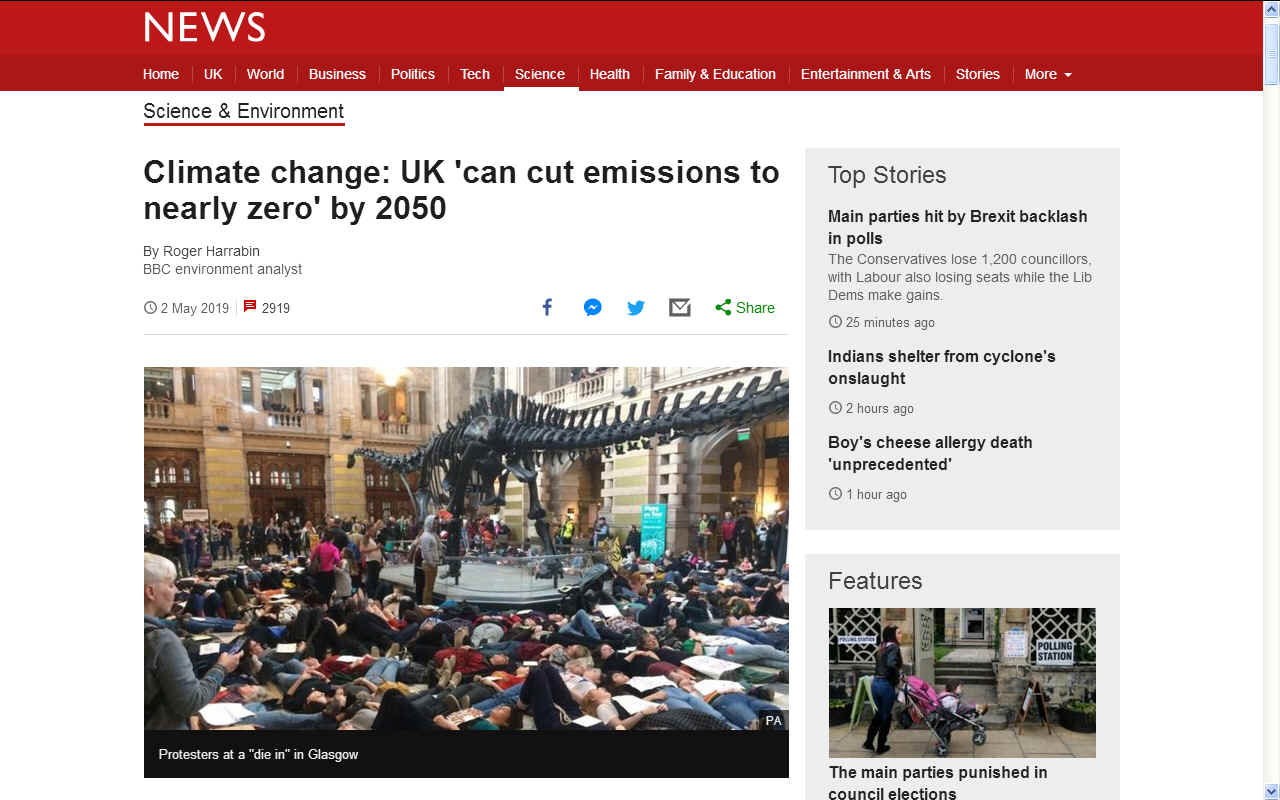|

EXTINCT
- A primitive Neanderthal skull from the Sima de los Huesos cave in Sierra de
Atapuerca, Spain. Homo Sapiens will soon be just skulls and bones in a
mass graveyard caused by climate change, humans
will cease to exist.
BBC NEWS MAY 2 2019
Climate change: UK 'can cut emissions to nearly zero' by 2050
The UK should lead the global fight against climate change by cutting greenhouse gases to nearly zero by 2050, a report says.
The Committee on Climate Change (CCC) maintains this can be done at no added cost from previous estimates.
Its report says that if other countries follow the UK, there’s a 50-50 chance of staying below the recommended 1.5C temperature rise by 2100.
A 1.5C rise is considered the threshold for dangerous climate change.
Some say the proposed 2050 target for near-zero emissions is too soft and still risks harming the climate. But others will fear that the goal could damage the UK's economy.
The CCC - the independent adviser to government on climate change issues - said that, while it would not be able to hit the target sooner, 2050 was still an extremely significant - and positive - goal.
The main author Chris Stark told me: “This report would have been absolutely inconceivable just a few years ago. People would have laughed us out of court for suggesting that the target could be so high.”
The main change, he said, was the huge drop in the cost of renewable energy prompted by government policies to nurture solar and wind power.
The other big shift, he said, was in the public mood following the BBC's David Attenborough climate documentary, street protests by Extinction Rebellion and speeches in the UK by the teenage campaigner Greta Thunberg. These have helped persuade people of the urgency of the problem, he believes.
But Mr Stark said there was no way the 2050 target would be achieved unless the government put policies and money in place to support it.
And he noted that the UK was already slipping away from a legal obligation to cut its emissions step-by-step between now and 2032.
The cost of the new proposal, the CCC estimates, is tens of billions of pounds a year.
To put it another way, the cost would reach just 1-2% of national wealth (as measured by GDP) each year by 2050. And that doesn’t count the benefits of decarbonisation - such as cleaner air and water.
The CCC said England can eliminate emissions by 2050, while Scotland could go carbon-free sooner - by 2045. This is because Scotland has exceptional potential for planting trees (which absorb carbon dioxide) and it's more suited to carbon capture and storage technology.
Wales can only cut 95% of its emissions by 2050 because of its farm industry. Northern Ireland will follow England’s targets.
The government is studying the report, which has substantial implications for public finances, and says "this report now sets us on a path to become the first major economy to legislate to end our contribution to global warming entirely".
The plan is for “net zero“ emissions by 2050, which means balancing carbon emissions with carbon removal. But in practice, this will require radically reducing the amount of CO2 we put into the atmosphere. Any emissions that can't be prevented then need to be captured and stored (for example, where CO2 is collected from a power station chimney and buried underground) or offset by planting new trees.
Under the proposed target, the UK will stop adding to global warming by the middle of the century - though its historic impact on the climate since the Industrial Revolution will remain huge, as CO2 lasts in the atmosphere for more than 100 years.
Until now, the target had been to reduce emissions by 80% compared with 1990 levels by 2050.
How would this affect the public?
The CCC believes that achieving zero emissions depends on low-carbon technologies, industry, and the public sharing the impact.
It estimates that about 38% of the change can be achieved through low-carbon technologies, 9% would depend mainly on societal or behavioural changes alone, and 53% would depend on a combination of both.
But it argues that "action is preferable to inaction", given the risks of unchecked climate change, and because the overall economic impact is likely to be small.
There are many gains, including significant benefits to human health, and better air and water quality. Innovation and falling technology costs have also made it cheaper to achieve carbon targets.
Here are some of the report's recommendations for individuals.
Home heating
We need to insulate our homes much better, probably with help from the Treasury. Some of us will use heat pumps, which are a sort of reverse refrigeration technology that sucks warmth from the ground.
Many of us will convert our natural gas boilers to hydrogen boilers, although this will be less disruptive than the 1960s change from town gas to natural gas, the report says. It's expected that government cash will be needed.
The committee expects consumer bills to rise at first, then fall as a newer, cheaper electricity generators are introduced.
The report also has one controversial recommendation: to turn down the home thermostat to 19C in winter.
Flying
The aviation industry is trying to bring down the cost of making jet fuels from a variety of waste materials.
The CCC says this won’t be enough. It warns that the number of flights we take is increasing, and predicts that the government will have to find ways to constrain this.
However, it doesn’t say how – and the committee chair, John Gummer, ducked a question about Heathrow expansion at the press launch of the policy.
Cars
The report say we won't need to overhaul our motoring habits, but eventually we will be driving electric cars.
The government has set a target date of 2040 beyond which conventional car sales will be banned.
However, the committee says that deadline should be 2030 - or 2035 if there is a problem with raw materials to make batteries.
Meat
The committee notes many people are already eating less red meat for the health of the planet and themselves.
It says that people can reduce their dietary emissions by 35% if they transition from a high-meat diet to a low-meat diet.
But it only predicts a 20% drop in meat consumption by 2050 – which it admits is a conservative assumption.
Waste:
Bio-degradable waste should not be sent to landfill after 2025. This means we would all be obliged to separate our food waste from other rubbish.
What else can I do?
The report also says people can take the following steps to reduce their emissions:
* Choosing to walk, cycle or take public transport instead of a car
* Choosing LED light-bulbs and electric appliances with high energy efficiency ratings
* Setting the water temperature in their heating systems to no higher than 55C
* Eating a healthy diet, with less beef, lamb and dairy
* Eliminating food waste as far as possible
* Using only peat-free compost
* Choosing good quality products that last longer - and sharing rather than buying items, like power tools, that you use infrequently
* Checking your pension funds and ISAs to see if your investments support low-carbon industries
Which businesses and sectors would be affected?
The big push is to decarbonise industry and heat generation. Carbon capture technology will be needed on many of the major emitters exposed to global competition: the
steel, paper, aluminium and paper industries.
Firms at risk will need help from the Treasury, the report says.
Meanwhile, agriculture is a major emitter of
greenhouse gases through sheep and cattle burping methane, and from fertilisers.
Farmers have largely escaped attention on climate change, but the committee says this will have to change.
They would need to reduce the amount of land in pasture, increase woodland, and feed cattle food that creates less methane gas.
Luckily, the government has a pot of money at the ready thanks to the end of direct farm payments after Brexit.
The fracking industry would also be affected - the committee says we should only use fracked gas in the UK if it substitutes for gas that would otherwise be imported as the UK transitions to a low-carbon economy.
And it warns against building a big gas infrastructure that would prove redundant as gas is phased out.
Is the target realistic?
As you might expect, there have been a range of responses to the report.
Environmental groups are supportive - although many think the target date is too conservative.
The UK Health Alliance on Climate Change has called on the government to adopt the recommendations but "adopt a net-zero target before 2050".
Lorna Greenwood of Extinction Rebellion told me: "2050 condemns us to a bleak future. We may as well not have a target at all... Others are already dying round the world thanks to inaction and far-off target setting."
The environmental campaign group WWF has said: “The problem is, we’ve been acting as if we have time. But if we want a world with coral reefs, safe coastal cities and enough food for everyone, we must act now."
Business and industry groups have expressed support but argue they need government help.
Rain Newton-Smith, chief economist at the Confederation of British Industry (CBI) said: “The UK should do all it can to mitigate the worst impacts of climate change. What we need now is a supportive and timely response from the government to enact this ambitious target."
Meanwhile, Minette Batters, the president of the farm union NFU, told me: “We take the climate issue very seriously. With Brexit and the government’s Agriculture Bill the government can shift farm support towards helping farmers reduce greenhouse gas emissions.”
Some experts have pointed out that there are plenty of practical challenges.
Dr Shaun Fitzgerald, Director of The Royal Institution, said: “I am a massive supporter of efforts to reduce greenhouse gas emissions. But are all the recommendations realistic?
"Will people be prepared to set their winter time thermostat to 19C? Asking people to put up with a reduction in comfort/quality is going to be difficult.
“There is also the practical challenge of our existing building stock in terms of the number of skilled workers to undertake the work, and then of course the barrier of getting homeowners to get the work done."
By Roger Harrabin BBC environment analyst
LINKS
& REFERENCE
https://www.bbc.co.uk/news/science-environment-48122911

. Anthropology
| Archaeology | Dinosaurs
| Evolution | Fossils
| Geology | Mammoths
Meteorites
Paleontology
| Plate Tectonics | Neanderthal
Man

Evolution
accelerated by man
an
anthropological anthem by Jameson
Hunter
OTHER
ANIMALS:
|
AMPHIBIANS |
Such
as frogs (class: Amphibia) |
|
ANNELIDS |
As
in Earthworms (phyla: Annelida) |
|
ANTHROPOLOGY |
Neanderthals,
Homo Erectus (Extinct) |
|
ARACHNIDS |
Spiders
(class: Arachnida) |
|
ARTHROPODS |
Crabs,
spiders, insects (phyla: Arthropoda) |
|
BIRDS
|
Such
as Eagles, Albatross
(class: Aves) |
|
CETACEANS
|
such
as Whales
& Dolphins
( order:Cetacea) |
|
CRUSTACEANS |
such
as crabs (subphyla: Crustacea) |
|
DINOSAURS
|
Tyranosaurus
Rex, Brontosaurus (Extinct) |
|
ECHINODERMS |
As
in Starfish (phyla: Echinodermata) |
|
FISH
|
Sharks,
Tuna (group: Pisces) |
|
HUMANS
- MAN |
Homo
Sapiens THE
BRAIN |
|
INSECTS |
Ants,
(subphyla: Uniramia class:
Insecta) |
|
LIFE
ON EARTH
|
Which
includes PLANTS
non- animal life |
|
MAMMALS
|
Warm
blooded animals (class: Mammalia) |
|
MARSUPIALS |
Such
as Kangaroos
(order: Marsupialia) |
|
MOLLUSKS |
Such
as octopus (phyla: Mollusca) |
|
PLANTS |
Trees
- |
|
PRIMATES |
Gorillas,
Chimpanzees
(order: Primates) |
|
REPTILES |
As
in Crocodiles,
Snakes (class: Reptilia) |
|
RODENTS |
such
as Rats, Mice (order: Rodentia) |
|
SIMPLE
LIFE FORMS
|
As
in Amoeba, plankton (phyla: protozoa) |
|
|
|

